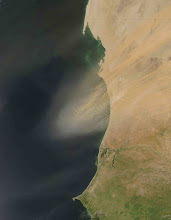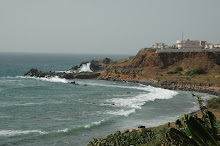THURSDAY DECEMBER 20
EXCLUSIVE VIDEO FOOTAGE BELOW!!

Muslim families sacrifice a goat or sheep or cow each year in gratitude for the sparing of Abraham's son. (When I left Dakar, roadsides and major intersections were filled with thousands of sheep for sale at makeshift markets. It reminded me of the hundreds of Christmas tree stalls in every city in the United States--though those generally smell better!) The sacrificed animal is divided and shared with family and with the poor. The rest of the day and the following day are spent in celebration with special meals, visiting of friends, and gift-giving.
We took the day to travel over roller-coaster quality, unpaved roads to Pont de Dieu--"Bridge of God"--a natural bridge on the penultimate level of a 5-tier waterfall. In the above picture, I'm standing on the middle level, just below the bridge, photographing Jim as he photographs me.
On the way home, we stopped by the city market for a few food items. Jim and Becky���s blonde two-year-old Hannah was the center of attention until Becky came back from her search for cooking oil trailed by four nyamakalabhe���musicians who insert themselves into social settings such as weddings and baby-naming ceremonies in hopes of securing cash donations. They welcomed me to Dalaba, singing ���You have come to Dalaba, You have come a long way,��� and similar phrases over and over . . . until I paid them to stop! One man played a djembe, a west African drum; one played a reed flute; and two played lalaade (singular: lalaangii), shakers made from wooden disks stacked on small, angled tree branches.
Back "home" at our mountainside cabin, we could hear the Tabaski/Donkin celebrations until 10 pm under the nearly full moon, with both children and adults chattering excitedly along the road that runs along the bottom of the hill on which our cabin sits.





